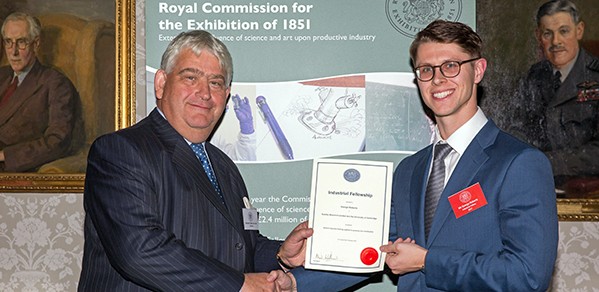
A Cambridge PhD student has been awarded an Industrial Fellowship worth up to £80,000 to help unlock the commercial potential of his data transmitter technology.
I’m working on a technology known as quantum key distribution (QKD), which enables perfectly secure telecommunications based on the fundamental laws of physics; hence QKD-encrypted data is future-proof.
George Roberts
George Roberts, who is a student with the EPSRC Centre for Doctoral Training (CDT) in Integrated Photonic and Electronic Systems (IPES), has been named as one of the UK’s most promising young doctoral engineers by the Royal Commission for the Exhibition of 1851.
His project – joint with Toshiba Research Europe – is a data transmitter to standardise next-generation quantum communications. It works by sending single particles of light between two parties. Anyone wishing to eavesdrop on the communication will change properties of the light in a manner which will be observable to the legitimate users. This means hacking attempts can be quickly spotted and security tightened.
“I’m working on a technology known as quantum key distribution (QKD), which enables perfectly secure telecommunications based on the fundamental laws of physics; hence QKD-encrypted data is future-proof,” said George.
“Developments to QKD will likely involve networks comparable to today's internet, where many different users can communicate with one another securely. Unfortunately, a number of different methods of implementing QKD have been developed, each with their own benefits, but each with a different transmitter and receiver. This would make a network overly complicated and expensive if all users are to be linked.
“The technology that I’ve worked on, joint with Toshiba Research Europe, allows all different types of QKD to be implemented using a single transmitter. This would greatly simplify future secure networks. Also, this novel transmitter is power efficient, simple and has a small footprint.”
The three-year Fellowship will provide George with the means to develop this innovative technology, ideally leading to a patent, while completing his PhD.
George added: “I’m honoured to receive this Fellowship. I will now be able to obtain equipment enabling me to explore novel features of my transmitter in the final year of my PhD. It will also mean that I can present my research at many conferences and this introduces me to a network of Industrial Fellowship alumni.”
Dr Seb Savory, Lecturer in Photonics and RF Systems, who supervises George, said: “I’m very happy to see George be awarded this prestigious Industrial Fellowship. He has been an excellent doctoral student and this award will both support his industrially linked research but also its dissemination through travel to leading international conferences.”
Professor Richard Penty, Site Director for the IPES CDT, said: "I'm delighted that a student from the IPES CDT has been awarded such a prestigious Fellowship. His work with Toshiba has great potential for the development of much more secure communications networks at the physical level."
Originally set up by Prince Albert following the Great Exhibition of 1851, the Industrial Fellowships recognise the best research that could advance British industry and funds are awarded to bring them to market.
Bernard Taylor, Chairman of the Royal Commission for the Exhibition of 1851, said: “Ensuring Britain’s young scientists and engineers are supported is crucial to ensuring that the UK is at the forefront of innovation in the years to come. Our Industrial Fellowships are designed to fund and commercialise the most promising technologies that could shape our society in the future. This year, we have awarded more Fellowships than ever before, which demonstrates that the talent in the UK is only growing.”
Applications for the 2018 Industrial Fellowships are now open.

